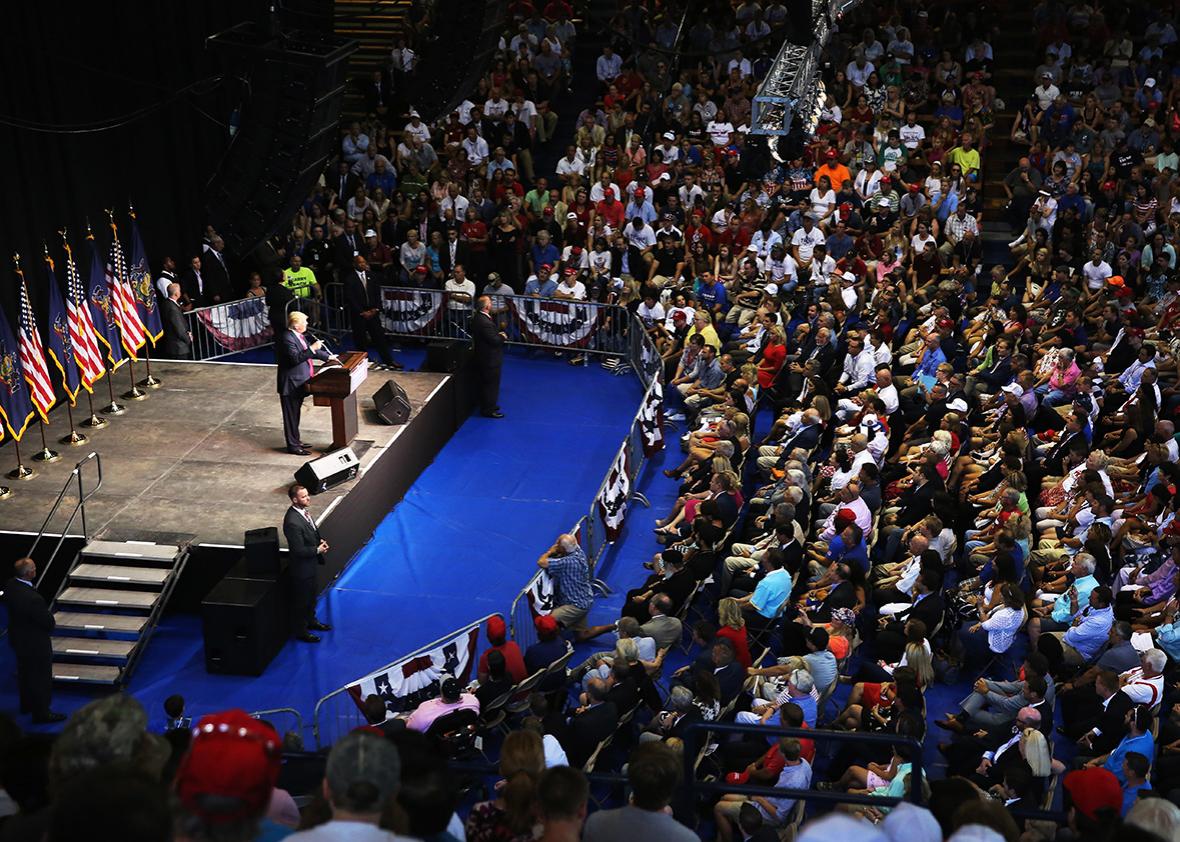The past 24 hours or so have been a big adventure for Donald Trump. In a disastrous and distracted Washington Post interview, he declined to endorse Paul Ryan, who is facing a primary. He condemned John McCain, also facing a primary, for not doing a “good job for the vets.” He downplayed sexual harassment in the workplace. He mocked and removed a mother and her crying baby from a rally. He suggested, again, that the election might be “rigged.” He accused Khizr Khan, father of a fallen soldier, of being “bothered” by his plan to keep “radical Islamic terrorists” out of the country. At least one person close to his campaign said that the staff was “suicidal.”
There’s more! President Obama condemned him as “unfit to serve” and pressed Republican leaders to abandon their party’s White House nominee. Two high-profile Republicans, Rep. Richard Hanna and former California gubernatorial candidate Meg Whitman, announced their support for Clinton. Republican National Committee Chairman Reince Priebus is reportedly “apoplectic” over Trump’s snub of Ryan, and a group of Trump advisers are planning an “intervention” over his recent behavior.
This isn’t the worst 24 hours for a modern presidential candidate—that distinction goes to the day Thomas Eagleton told reporters he had been treated for “nervous exhaustion,” sparking a furor that ended after George McGovern forced him off the presidential ticket—but it’s close enough that senior Republican officials are exploring their options should Trump drop out and leave the race for president. (The short answer is that the 168 members of RNC board would have until early September to pick a new nominee.)
It’s not unimaginable that Trump would flounce from the election. He’s an impulsive, immature man, consumed with narcissism and obsessed with “winning” as a measure of basic human worth. The worst thing you could be, in the world of Donald Trump, is a “loser.” And right now, he looks like one. According to FiveThirtyEight’s “polls-only” forecast of the election, Trump has a 31.6-percent chance of winning in November. At the Princeton Election Consortium, Sam Wang puts Trump’s odds at 20 percent. And in the Huffington Post average of all polls, he trails by almost 6 points, 41.1 percent to Clinton’s 46.9 percent. Some of this reflects the Democratic National Convention, which gave Clinton a substantial boost in the polls. Still, the underlying trend is real: Clinton is ahead.
Even worse for Trump is the fact that, in just a few months, he’ll have to face Clinton in debates, one on one. He won’t have the luxury of a crowded stage and a raucous audience. He won’t be able to mug for the camera and get by with insults and bluster. Primary season is over, and his successful approach there—soak up all the attention, prevent voters from so much as learning the names of his opponents—won’t fly anymore. He’ll have to know his stuff. But he won’t. He’s Trump. And if he’s anything like he’s been in interviews and on the stump, he’ll likely bomb the debates, failing in a way we’ve never seen before, much less imagined.
Given the choice between potential national humiliation and dropping out of the race, wouldn’t he leave?
No way.
If life is a dominance game and losing is verboten—and for Trump, both things are true—then the only thing worse than national humiliation at a debate or on Election Day itself is dropping out. Dozens of men have lost presidential elections. Some have even lost them in landslides. But Trump would be the first nominee to quit the presidential race. A world-historical loser who couldn’t follow through to the end. Next to that, a rebuke at the polls is nothing. And keep this in mind: Hyperpolarization in the electorate gives Trump a floor in the national popular vote. Add structural advantages for the challenging party, and there’s a decent chance that Trump comes close to Mitt Romney’s performance in 2012, which would put him above John McCain’s in 2008. A decisive loss but not an extraordinary one.
Remember, too, that a losing campaign can still draw crowds and make a splash. Tens of thousands of people will still cram gyms and fields and stadiums to see Trump, even if he’s losing. He’ll still have the praise and adoration of millions of people; he’ll still lead the Republican Party and command allegiance from most of its officeholders; he’ll still have his brand. Trump can still feel like a winner, even as he careens toward defeat. Indeed, Trump wouldn’t be the first presidential candidate who mistook the size of his crowds for the scope of his standing.
Trump is enough of an egomaniac that he wants to minimize the sting of defeat. It’s why he has questioned the schedule of the debates—in a failed attempt to alter them to his favor—and it’s why he continues to warn his supporters of a “rigged” election. But the same narcissism that leads him to run roughshod over political norms is what will keep him from dropping out of the race. It’s one thing to lose an election. It’s something else to be the biggest loser who ever graced American politics.
